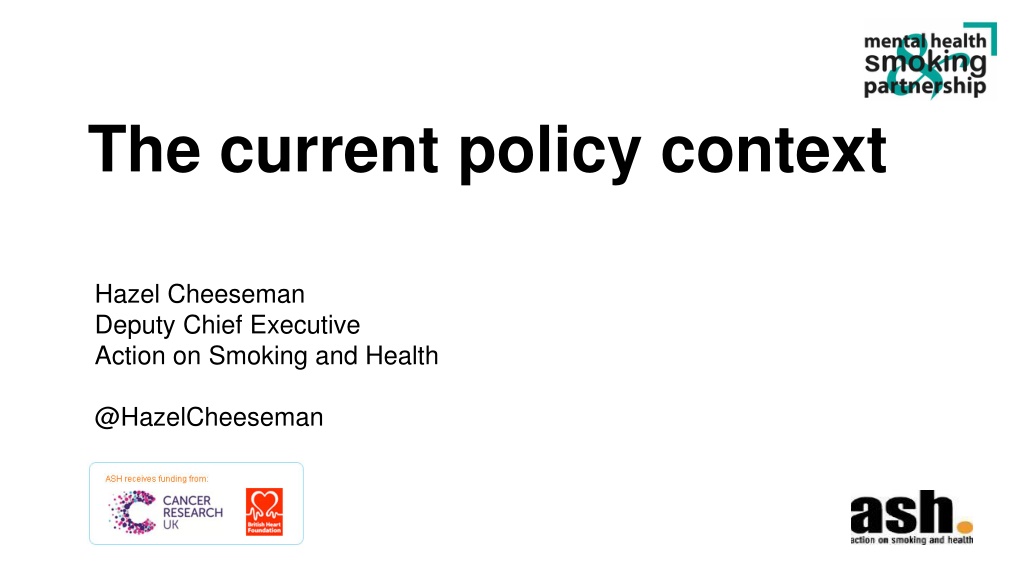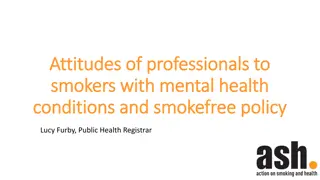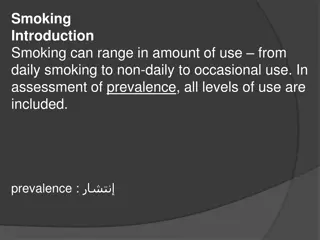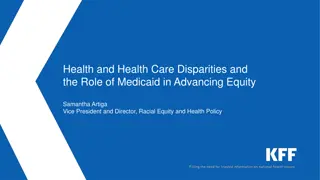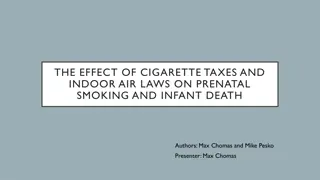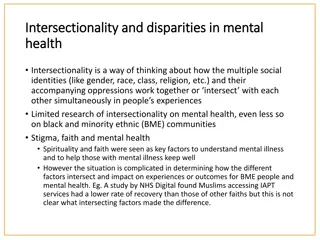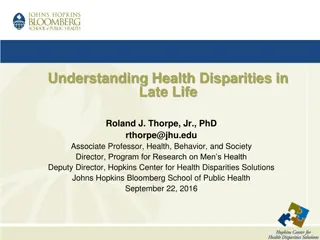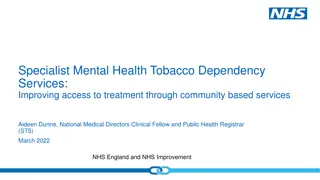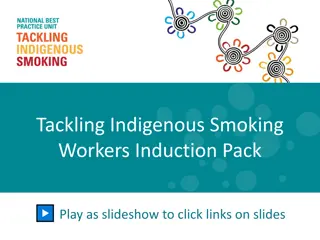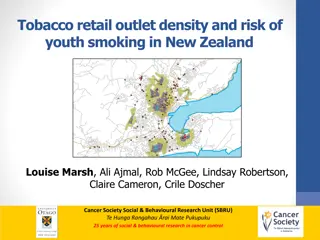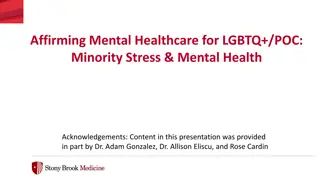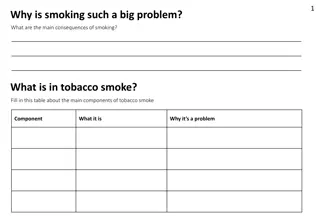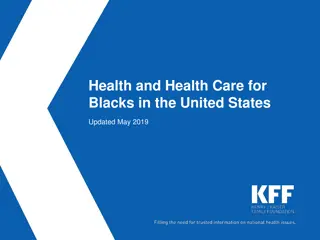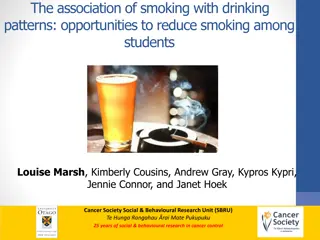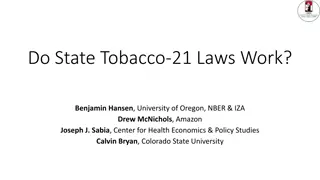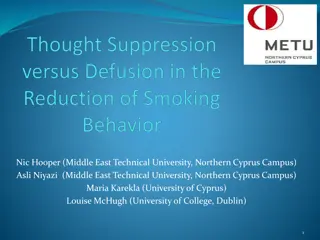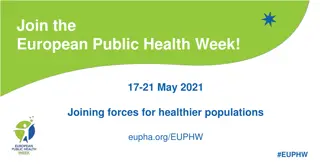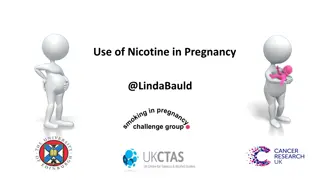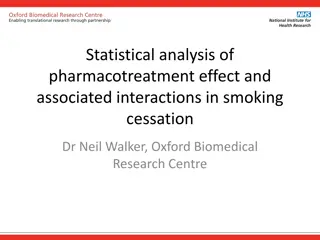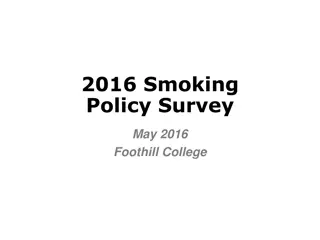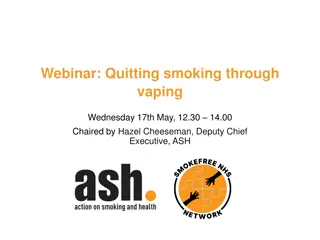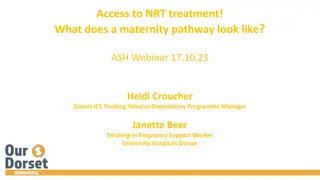Addressing Smoking Disparities in Mental Health Populations
Hazel Cheeseman, Deputy Chief Executive of Action on Smoking and Health (ASH), outlines key concerns about smoking inequalities in individuals with severe mental illness (SMI) and those with common mental health conditions. ASH's call to action includes raising awareness of the smoking-mental health link, reducing smoking rates in these populations, and tracking progress through data. Key policies and initiatives are discussed, emphasizing the need for smoke-free environments, improved guidance on vaping, and integrating smoking cessation into mental health treatment.
Download Presentation

Please find below an Image/Link to download the presentation.
The content on the website is provided AS IS for your information and personal use only. It may not be sold, licensed, or shared on other websites without obtaining consent from the author. Download presentation by click this link. If you encounter any issues during the download, it is possible that the publisher has removed the file from their server.
E N D
Presentation Transcript
The current policy context Hazel Cheeseman Deputy Chief Executive Action on Smoking and Health @HazelCheeseman
ASH: who we are Set up with the Royal College of Physicians in 1971 as a stand alone advocacy charity to campaign for evidence- based policy development and implementation Established the Mental Health and Smoking Partnership in 2016 following the publication of The Stolen Years
Big inequalities in smoking rates 6,000,000 45.0% 5,700,000 40.5% 40.0% 5,000,000 35.0% 4,000,000 30.0% 25.8% 25.0% 3,000,000 20.0% 2,000,000 15.0% 13.9% 1,600,000 10.0% 1,000,000 5.0% 230,000 0 0.0% General population People with depression and anxiety People with SMI number of smokers smoking rate
Our concerns 1. Massive inequalities for people with SMI caused by smoking 2. Large population of people living with mental health conditions who smoke 3. The mental health implications of smoking for all smokers
Partnership call to action 1. Public and professional understanding about the link between smoking and poor mental health is in line with the evidence Mid-range objectives Commitment on mental health in the next Tobacco Control Plan Commitment on smoking in any mental health strategy ICB prevention plans that includes action on smoking and mental health 2. Rate of smoking for people with SMI falls much faster than for the general population Mid-range objectives Deliver on existing commitments for SMI Improved guidance on and use of vapes in population Update CQC guidance 3. Rates of smoking for people with common mental health conditions fall faster than for the general population Mid-range objetives Exploratory work with IAPT provision Recognition of need for action in substance use and social housing provision 4. National and local data allows progress in reducing smoking in populations with mental health conditions to be tracked
Policy context Five Year Forward View for Mental Health all settings to be smokefree by 2018 but progress uneven: CQC guidance currently being reviewed Science and Technology Committee in 2018 called for consistent approach to vaping: Mental Health and Smoking Partnership guidance currently being updated Long Term Plan committed to establishing support for smokers with long term mental health conditions: ASH resource hub Core20PLUS5 health of people with SMI identified and link to smoking: ASH briefings for ICBs 2022 Khan Review recommendation - Tackle the issue of smoking and mental health. Disseminate accurate information that smoking does not reduce stress and anxiety, through public health campaigns and staff training. And make stopping smoking a key part of mental health treatment in acute and community mental health services and in primary care.
April 2023 Public Health Minister announcements Swap to stop Call on youth vaping and tackling illicit vapes Incentive scheme for pregnant women Engage with mental health settings (notably IAPT) to improve signposting for support Access to medications e.g. generic varenicline Pack inserts promote quitting consultation
What next? Major conditions strategy mental health and smoking scope for closer alignment? IAPT research due to be published, what is possible in this context? Evolution of the health inequalities work in NHSE Further roll out of support in MH community settings? Opportunity for MH providers in swap to stop programme? Health Select Committee Prevention Inquiry
